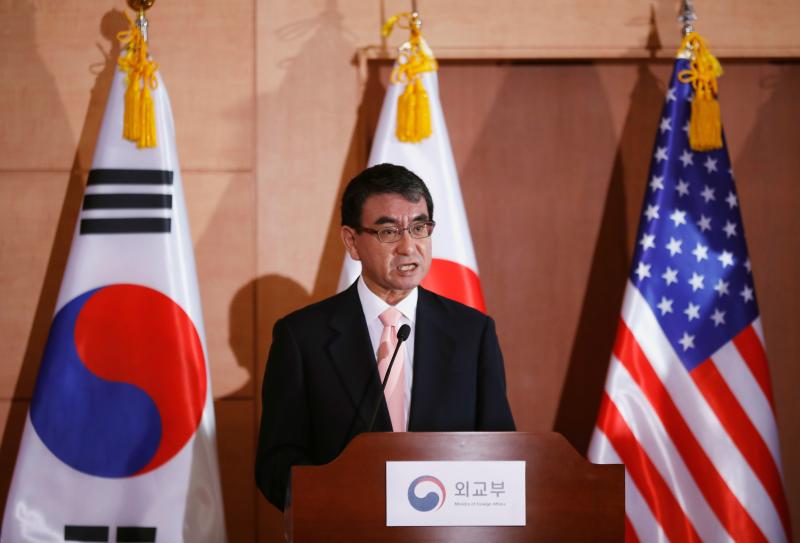Japan says joint military drills between US and South Korea are a 'vital security deterrent'
Sign up now: Get insights on Asia's fast-moving developments

Japanese Foreign Minister Taro Kono speaking at the South Korean Foreign Ministry in Seoul on June 14, 2018.
PHOTO: AFP
Follow topic:
TOKYO - Japan sees joint military drills between the United States and South Korea as a vital security deterrent in North-east Asia, Foreign Minister Taro Kono said in Seoul on Thursday (June 14).
Japanese diplomats, meanwhile, were also working to realise a summit between Prime Minister Shinzo Abe and North Korean leader Kim Jong Un, possibly in the coming months.
Mr Kono told a news conference alongside US Secretary of State Mike Pompeo and South Korean counterpart Kang Kyung Wha that while precise details of the halt in joint war games are to be ironed out between the US and South Korea, "we understand that any pause in exercise is contingent upon DPRK action towards denuclearisation".
DPRK, short for Democratic People's Republic of Korea, is North Korea's official name.
The trilateral talks involving the US and its two Asian security allies came two days after President Donald Trump met Mr Kim in a historic summit in Singapore that has been criticised as more style than substance for its vague joint declaration.
Said Mr Kono: "We understand that the US maintains its commitment to defend allies and its Japan-US security commitment, and US forces in Japan's posture remains unchanged. In any case, we would like to maintain close contact with them since these issues may also affect the security of Japan and the region."
Keio University expert Yasushi Watanabe told The Straits Times that the abrupt halt of joint military war drills - seemingly without first informing South Korea - has raised concerns in Japan that the US might some day unilaterally wind down its security commitments in the region.
This, he said, will not just be a win for North Korea, but also for China.
"Trump's decision is exactly what China has been demanding, a freeze-for-freeze," he said. "There is plenty of domestic concerns that the halt of exercises would also lead to further burdens on the part of Japan."
Meanwhile, Tokyo, which has long shunned talks saying that "dialogue for the sake of dialogue is pointless", is now working towards realising its first bilateral summit with Pyongyang in 14 years amid a peace drive on the Korean peninsula.
The Yomiuri newspaper reported that Mr Abe may visit Pyongyang in August for talks, though the meeting could also take place in the Russian city of Vladivostok in September on the sidelines of an annual economic forum.
Mr Kim, whose official title is Chairman of the State Affairs Commission, had himself told Mr Trump that he was open to the idea of meeting Mr Abe, local media quoted Japanese government officials as saying.
Kyodo News reported on Thursday that Japanese and North Korean officials have made informal contact at an international conference in Ulaanbaatar, Mongolia, where a senior diplomat conveyed Tokyo's position on resolving the longstanding abduction issue with the North.
This refers to the kidnapping of Japanese citizens by North Korean agents in the 1970s and 1980s. Five victims were repatriated to Japan after then Prime Minister Junichiro Koizumi visited Pyongyang for historic talks with then leader Kim Jong Il in September 2002, while a second visit led to a reunion between the victims and their North Korea-born children.
Analysts have said that Japan's hitherto hardline stance has been an impediment towards a full resolution of the issue.
Tokyo has long been stuck in a deadlock with Pyongyang. While Japan says there are 12 victims unaccounted for, North Korea has long insisted that eight of them have died while the other four have never entered the country.
In this regard, Mr Kim's remark that the issue "will be worked on", as conveyed by Mr Trump on Tuesday at a post-summit news conference, has been seen as a significant shift in Pyongyang's stance.
Mr Abe, who met relatives of abductees on Thursday, publicly extended an offer for talks with Mr Kim, though Tokyo has since reiterated that Mr Abe will go into a summit only if progress is to be expected.
Dr Watanabe, of Keio University, said that as the abduction issue was a legacy from the past - when his grandfather and then his father were in power - it "might be easier for Kim to face this issue more directly and more positively".
At a news conference on Thursday, top government spokesman Yoshihide Suga said that he hopes a Japan-North Korea summit could pave the way for the eventual normalisation of ties between the two countries.
For this to happen, Japan has made it a precondition that the North achieves the complete, verifiable and irreversible dismantlement of its nuclear stockpile and ballistic missiles of all ranges, and a full resolution of the abduction issue.

